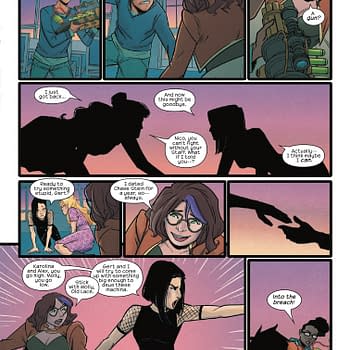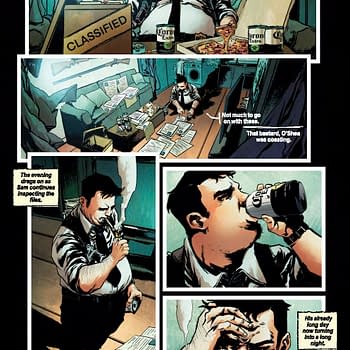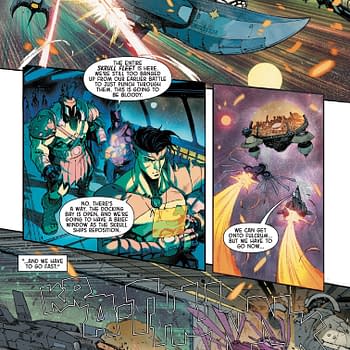Posted in: Comics, Look! It Moves! by Adi Tantimedh | Tagged: Comics, entertainment, f-compo, manga, transgender
F-Compo: A Transgender Family Manga From The Creator Of City Hunter – Look! It Moves! by Adi Tantimedh
Adi Tantimedh writes,
Mainstream – i.e. superhero – comics in the US are being dragged, sometimes screaming and kicking into the 21st Century lately, with calls for greater diversity in representation in race and gender. One particular minefield has been representation of transgender characters since there is so much confusion and ignorance with a few writes landing themselves in hot water in the past month.
The issue of representation has reminded me of a manga that ran from 1996 to 2000 by Tsukasa Hojo, creator of Cat's Eye, the female cat burglar series, and the globally-popular action comedy City Hunter, not to mention the latter's current sequel Angel Heart. This manga is his comedy series F. Compo, aka Family Composition.
College freshman Masahiko Yanagiba's parents have passed away and he is invited to live with his long-lost uncle's family the Wakanaes. At first overjoyed to be part of a family again, the lonely Masahiko is shocked to discover that his uncle Sora, a popular manga artist, is a trans man and his aunt Yukari a trans woman. He can't even tell if his teenage cousin Shion is biologically male or female, since Shion alternates between being a cute girl or a butch boy depending on the mood or day of the week. Even his uncle Sora's studio assistants are all trans women.
Masahiko gets over his initial shock and panic to accept living with his new family because of their kindness and warmth, and from here he begins his journey of gender re-education. When his uncle and aunt announce they're coming to his university commencement day to support him, he begs them to dress as their biological genders, only to discover that they look unnatural and like drag queens, and their trans identities are the ones in which they're most natural and accepted, since people can't tell they're trans. The cool, unflappable Shion also enrolls at his university as a boy, and, being a gleeful prankster, takes great pleasure at torturing him for his hetero anxiety and panic. When they join the university's filmmaking club, he finds himself playing a female character in their films, and his female alter ego is convincing and attractive enough to garner a fan following and even crushes from male students.
The series is ostensibly a comedy-drama with gender as its focus. Masahiko and the Wakanaes frequently find themselves in farcical situations involving gender-swapping and identity-hiding that would make George Feydeau proud. Masahiko and Shion hear about a con man seducing women around campus and set out to trap, only to discover he's actually a butch girl named Kaoru who's rebelling against her Yakuza father and winds up adopted by the Wakanaes as well. Kaoru's father Tatsumi comes storming in yakuza-style only to be tamed and befriended by Sora and Yukari, and Tatsumi falls in love with Yukari without knowing her biological sex. Masahiko gets a girlfriend in university and goes from trying to hide his female alter ego to having her accept him as role-playing for the film club. And so on.
This is an odd series from a more liberal and tolerant period in Japan. Japan does not have the best reputation for progressive feminist or LGBT thinking, but sometimes they try. In F Compo, much of the comedy and humour comes from the straight characters, both the men and women, going through homophobia and gay panic. It doesn't have the most enlightened view of gay or trans people, but there's a sincere desire to be more inclusive and understanding, Hojo's sympathies clearly being on the side of his trans family while Masahiko is frequently the target of the jokes rather than them. Issues like Sora's family disowning him for his gender identity is handled head-on with sympathy clearly on Sora's side.
One of Sora's transvestite assistants has to grapple with hiding his trans identity from his wife and child, and the cast rally to help. For all the slapstick comedy and farce, there are moments of real heartbreak and pain. Shion is even almost inhumanly cool and unflappable, streetwise and cunning and able to out-think and outsmart anyone's scheming. As one of the only gender-fluid heroes in comics and pop culture, Shion is practically an LBGT superhero, real biological gender deliberately kept a mystery by Hojo throughout the entire series even as he invites both male and female versions of Shion to be seen as a sex symbol. Even gangster-with-a-heart-of-gold Tatsumi doesn't question his daughter's butch, tomboy ways and seems to eventually accept every shock and surprise in stride. What's interesting is that while the series deals directly with gender, it's still coy about sex and sexuality, keeping it all on a prurient, PG level.
F Compo lasted 102 chapters, collected into fourteen paperbacks. It has been officially published every Asian language and in Europe but never in English. I originally read it in Chinese years ago. It never got an anime or live action TV adaptation. I don't know what inspired Hojo to create this series and stay committed to it for over four years and over two thousand pages. The series isn't perfect in its depiction of gender or LGBT issues, but it's surely an essential chapter in LGBT comics and cultural history. That it was never published in English and thus many historians, critics and scholars are unaware of it means there is a gaping hole in the history of representation in comics and pop culture. The whole series has been translated into English by fans and posted online, in violation of copyright, but in the interests of scholarship, it's the only way to read it in English. It's worth your time.
Gender-neutral at lookitmoves@gmail.com
Follow the official LOOK! IT MOVES! twitter feed at http://twitter.com/lookitmoves for thoughts and snark on media and pop culture, stuff for future columns and stuff I may never spend a whole column writing about.
Look! It Moves! © Adisakdi Tantimedh

























